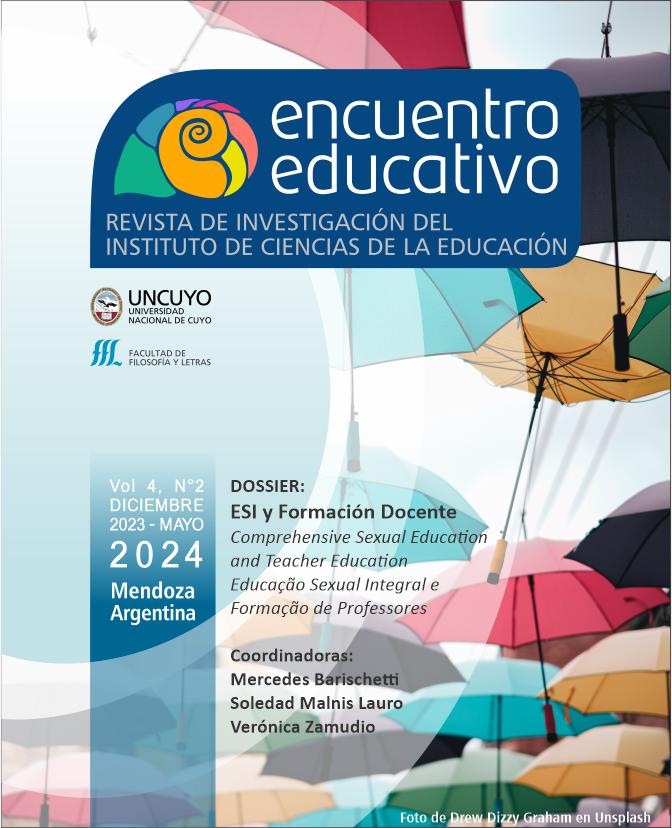Art, gender and comprehensive sexual education in teacher training.
From gouge to the ink that narrates corporalities
Keywords:
university teacher education, comprehensive sexual education, literature, sociology, artsAbstract
Comprehensive Sexual Education (CSE) marked an indisputable turn in the ways of conceiving sexuality, and the place of the State and families in the education of children, the youths and adolescents in Argentina. The different educational levels have been questioned since the enactment of this regulation and teacher
education is no exception. In an uneven way, in the Institutos Superiores de Formación Docente (ISFD) CSE was incorporated in specific spaces, while in national universities and in university teaching staff its inclusion has become more
elusive. National regulations (Law 26.150/2006) do not include universities due to the academic autonomy they hold. However, the exemption from the obligation does not disqualify them from being incorporated into the program of study.
Above all, taking into account that the graduates of university teaching staff have the responsibility of the exercise of teaching in areas of competence of the CSE.
In this sense, in this article we present the meeting and disagreement points in the forms of inclusion of CSE in teacher education in the careers of Art, Letters and Sociology in public (national) university institutions located in the Ciudad Autónoma of Buenos Aires. In the three investigations that gave place to this results, a fundamentally qualitative methodology was utilized, which recovers the traditions of educational ethnography and grounded theory for the construction, analysis and processing of data.
References
Butler, J. (2002). Cuerpos que importan sobre los límites materiales y discursivos del “sexo”. Paidós.
Díaz, E. (10 de diciembre 2021). Mi cuerpo es todo lo que tengo. Diario Página /12. URL: https://www.pagina12.com.ar/387755-mi-cuerpo-es-todo-lo-que-tengo.
Dillón, M. El destape radio Pasamos Todes [@eldestape_radio] (5 de noviembre 2021). [Tweet]Twitter. URL: https://twitter.com/eldestape_radio/status/1456634319976505346?ref_src=twsrc%5Etfw%7Ctwcamp%5Etweetembed%7Ctwterm%5E1456634319976505346%7Ctwgr%5E2f19398794972585c2154c7bc805b4cfb5027d3f%7Ctwcon%5Es1_&ref_url=https%3A%2F%2Fd-9214189173076893883.ampproject.net%2F2310271806000%2Fframe.html.
Dolinko, S. (2016). Consideraciones sobre la tradición del grabado en la Argentina. Nuevo Mundo Mundos Nuevos. DOI: https://doi.org/10.4000/nuevomundo.69472
Faur, E. y Lavari, M. (2021). Cuatro pasos para prevenir la violencia basada en género. Kit de herramientas teóricas y prácticas para escuelas y comunidades. Spotlight, UNFPA.
flores, v. (2021). Romper el corazón del mundo. Modos fugitivos de hacer teoría. Continta me tienes.
flores, v. (agosto de 2022). Lo personal es pedagógico. El sexo en el aula. Conversatorio con val flores La Coope ISFD 19, CIPES 19, La Colectiva. Instituto Superior de Formación Docente 19. Mar del Plata, Argentina. En: https://drive.google.com/file/d/1qtRzhq4YSMsS_WGLtdrkW1xksKQfhMPM/view
Giunta, A. (2018). Feminismo y arte latinoamericano. Siglo XXI Editores Argentina.
González, M., Talani, P., Patiño, V. y Jofré, A. (2022). Formación Docente, arte, educación sexual y perspectiva de género: Del gubiazo a las calles. En D. Kaplan. La ESI en la práctica. Trayectos y escenarios posibles: docentes que ponen el cuerpo. (PP. 157-167) Noveduc.
Guzmán, A. (2015). Feminismo Comunitario-Bolivia. Un feminismo útil para la lucha de los pueblos.
Revista con la a. (38). URL: https://conlaa.com/feminismo-comunitario-bolivia-feminismo-util-para-la-lucha-de-los-pueblos/ ?output=pdf
Korol, C. (2007). Hacia una pedagogía feminista. El Colectivo, América Libre.
Korol, C. (2016). Feminismos populares. pedagogías y políticas. Ediciones América libre. Chirimbote. El colectivo.
López-Andrada, C. y Pérez de las Vacas, S. (2020).Entrevista con Adriana Guzmán sobre descolonización de los feminismos en Mérida (Extremadura). Polyphōnía. Revista de Educación Inclusiva, 4 (2), 304-311.
López. M. (2019). Apuntes para las militancias. Feminismos: promesas y combates. Estructura Mental a las Estrellas.
Merlin, N. (2017). Colonización de la subjetividad. Los medios masivos en la época del biomercado. Ed.Letra Viva.
Pizarnick, A. (2016). Poesía Completa. Poema: La palabra que sana. Editorial Lumen.
Ruiz Repullo, C. (junio de 2016). Los mitos del amor romántico: S.O.S celos. En mujeres e investigación. Aportaciones interdisciplinares. VI Congreso Universitario Internacional Investigación y Género. Sevilla, España.
Sanchez Sainz, M. (2019). Pedagogías Queer ¿Nos arriesgamos a hacer otra educación? Catarata.
Talani Zuvela, P., Copolechio Morand, M. (2023). Sexualidad, cuerpos y perspectiva de género en la formación docente. Reflexiones teóricas y experiencias pedagógicas de ESI. Colección Universidad. Noveduc.
Vallecillo, M. G. y Palacio M. [Alzá La Voz Contra La Violencia Hacia Las Mujeres] (2011). Un aplauso para el asador. [video]. Youtube. En: https://www.youtube.com/watch?v=jHCeGukRK_Y
Varela, N. (2019). Feminismo 4.0. La cuarta ola. Penguin Random House Grupo Editorial.













